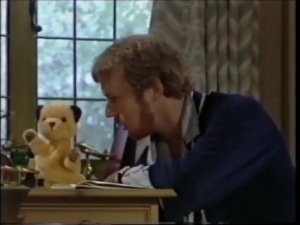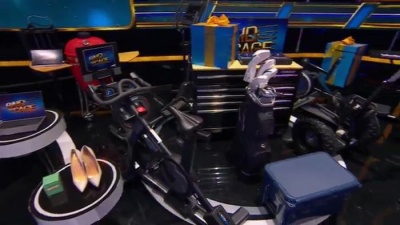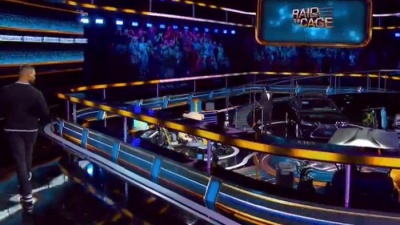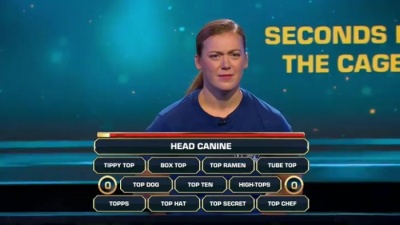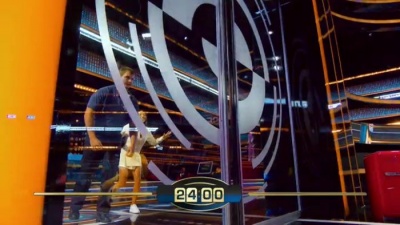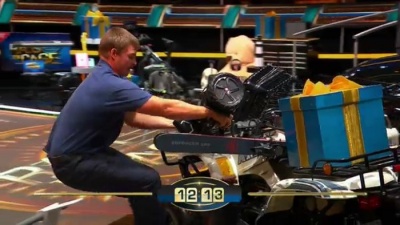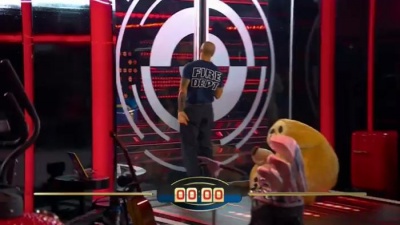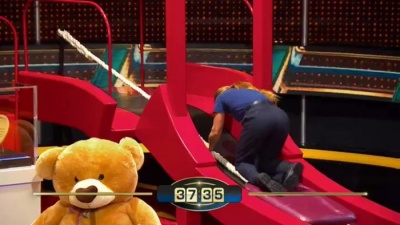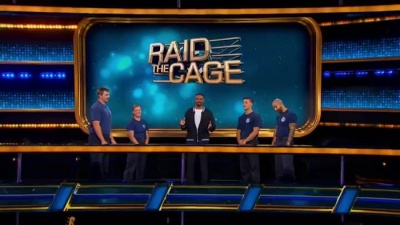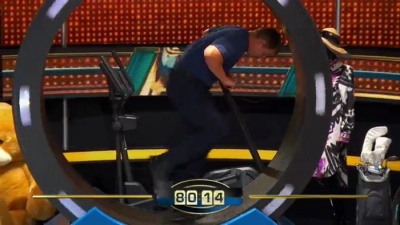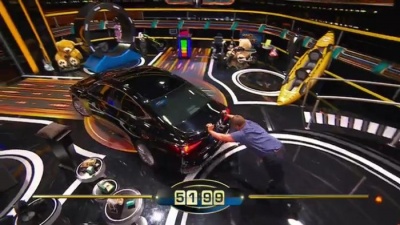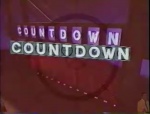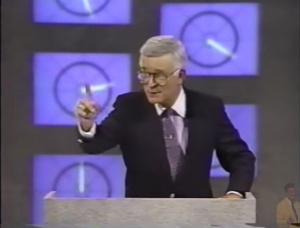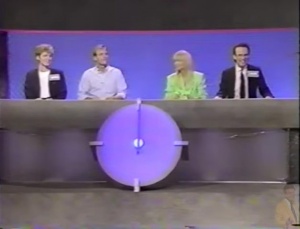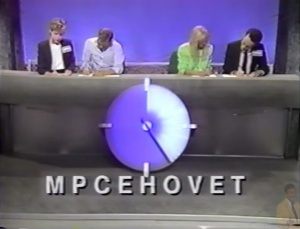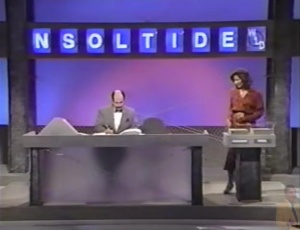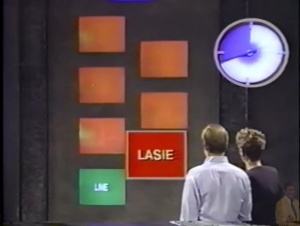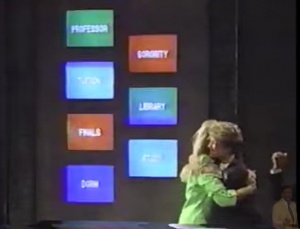Weaver's Week 2023-10-29
Last week | Weaver's Week Index | Next week
According to our friends at Buzzerblog, Raid the Cage is basically all Sweep all the time. Whatever would Sooty say?
Contents |
Raid the Cage
Two Shakes Entertainment and Sony Pictures Television for CBS, from 13 October
No title sequence, just a 68-second sizzle reel selling the game's main points. Teams get time in a "cage" of prizes. Whatever they can get through the doors is theirs to keep; but if the player raiding the room gets locked in, they lose everything. Does it take 68 seconds to set up the tag line: "get in, get out, get rich"? Evidently so.
The set is suitably huge. It has to be: they've got a whole "cage" down there full of prizes. The cage is on the studio floor: one of our hosts stands on a large platform to one side of the studio, and it's here where the contestants gather. A crowd sits in raked seats looking down on the action. Buried in the credits is the fact that Raid the Cage is recorded in Mexico City, where a local version's been in production for some years. The format was created by Shy Barneli, Tal Berman, and their United Studios of Israel Ltd company.
Two hosts for this production – Damon Wayne Jr up on the balcony, and Jennie Mai down on the floor. Two pairs of contestants, all wear the same colour t-shirt – it's unusual to dress the teams up and not to colour-code them for our convenience. Most of the show's set is in shades of navy blue, teal, and gold.
The "first" decision Damon asks the team to make is to decide who is the "gabber" and who is the "grabber". (Let's be honest: the first decision was to apply for this show, but let's lean into the show's illusion.) The "gabber" will stay on the upper deck with Damon, and try to answer trivia questions. The "grabber" will descend to the floor using some handily-provided stairs, and eventually enter the cage, where they will attempt to grab things.
We begin with a round of trivia. Eleven answers in a selected category (for instance, "short phrases containing TOP"). Ten of them will be correct. Each answer is only right once. Errors will be indicated, but the wrong answer and right answer will both remain in play – it'll be an extra distraction for later questions. 45 seconds to solve all ten clues. There's 3 seconds in the cage for each correct answer.
Which brings us to the first raid of the cage. And we see that it's not actually a cage, there are no metal bars round the side, though there is a large and imposing double door to block entry and exit. Presumably they didn't want to use the title "Raid the courtyard of prizes".
So, get in, get stuff, get out before time expired. "Oh, that's easy, just watch the countdown on the big screen." They've thought of that. No countdown on the big screen. No indication that time is expiring until a three-second countdown and the doors start to close – not long enough to get out from the far side of the cage area.
And so, at 6 minutes 44 seconds into the show, Damon completes the catchphrase. "It's time to Raid! The! Cage!" Our player goes in, loads a number of prizes onto a golf buggy, and hauls it out. He leaves about 5 seconds on the clock, and there seems to be a rule that once you're out, you can't go back in again.
What has our grabber won? An expensive bag, that golf cart, hoverboard, skis, some very rare wheelie luggage without Richard Osman's face, a total value of US$6418. That's roughly one month's average household income.
The other team has a go with the other set of questions, and get themselves locked in. Oh dear. Never mind.
Rounds two and three continue in a similar style. The questions get a little tougher, and the time for a correct answer goes up – 5 seconds in round two, 7 seconds in round three. The prizes get somewhat more valuable. And there are bizarre stunts to do, haul yourself up a slide while kneeling on a skateboard to win a motorbike. Players put items in their pockets, and perhaps try to stuff things down their tops.
As it's an American show, they're going to describe the prizes in great detail. At times, it feels like we're being advertised at. All of the manufacturers get a name-check, all of the models get a name-check – they've gone for top-of-the-range mobile phones and tablets, likely for very decent motors and luggage. All of the prizes are moderately aspirational, somewhat fashionable – there are no washer-dryers or dishwashers here.
The cage also has a number of "mystery boxes", cube gift packages, blue with gold ribbon tied into a neat bow. These can be brought out, and they hide something valuable – it could be an expensive handbag, or more electronica, or a token for a holiday somewhere snazzy. One of the boxes – a "mega mystery box" – contains a star prize. Damon will describe it every blimmin' time until it's won.
Some of the rules are explained by example. If any part of an object is out of the cage, it counts, along with everything resting on it. At least some part of the human needs to be out when time expires, it can be as little as a foot or a nose.
Some of the rules are not explained in the commentary. Once you're out of the cage, you can't go back in again – that's never stated, we get it from observation. Also, you're not allowed to push things out of the cage while you remain in it – can't shove the expensive mobile phones out of the door, then run back in for the golf cart. Everything must be in contact with the grabber's body, either directly or through an unbroken chain of material without an air gap.
As it's an American show, we're going to get advertised at. A lot. Five internal breaks during the programme, with a reset after each, and a recap just before. The show is very stop-start as a result.
And as it's an American show, they're going to cheer and whoop and holler like nobody's business. The energy remains high throughout the hour, cresting with those magic minutes when somebody is in there, doing a raid! the! cage!
The grand finale is a bonus round, played only by the team who have emerged on top from the main game. (Their vanquished opponents leave with nothing.) No questions, a full 90 seconds in the cage, the players go in one at a time and tag each other out. Yes, players can go back in, but only when tagged. Three stunts hide prizes, one of them is a brand new car.
Our winners get to keep what they bring out in this round – but only if it's valued at $50,000 or more. Fail to reach that target and the cage beats them. It's 90 seconds of frantic fun, and perhaps the only way to lose is to run out of time.
Over at Buzzerblog, they've compared Raid the Cage to Supermarket Sweep. We see where they're coming from. For us, another good comparison is Double Dare – we may not see Peter Simon falling over, but we do have some trivia questions, stunts, prizes, good-natured silliness, and bags of energy.
Could Raid the Cage work over here? In theory, yes. There's always a spot for big dumb shows – and Raid the Cage is a very big and relatively dumb show. It's the sort of thing to amuse all ages, grown-ups have their strategies, grandparents marvel at the athleticism, youngsters join in the energy.
But the prizes present a significant problem – our sample episode gave away prizes valued at $130,577, which might be too much for any single broadcaster. An advertiser-funded show might meet this gap – but what mass-market advertiser can fund prizes of £100,000 per hour? Fashionable products don't come cheap, and the show would be much less fun with mid-range phones and a brand new pedal car.
So while we can see Raid the Cage could work, we fear that it will be too expensive to pass muster.
Countdown
Guber-Peters Entertainment Company, non-broadcast pilot, recorded 18 September 1990
The long-lost American pilot for Countdown emerged on the interwebs last week. Here's what happened.
Host for this pilot is Michael Jackson. No, not that one, he was still a few years away from running BBC2. No, not that one, he was recording one of his incredibly long music videos.
The contestant's side of the set is two pairs of two, with a large analogue clock between them. Celebrity and civilian player on each team. There are two people in Dictionary Corner, they're Tony Pandorfo and Laurie Huggins. Tony appears to be issued with a massive computer screen, Laurie has a dictionary open on the desk beside her.
Now, for anyone who hasn't watched television of any quality at any point in the last 41 years, the rules of Countdown are a little opaque. Michael Jackson explains them like this:
- "We start with one team selecting nine letters of the alphabet that have been shuffled and placed in stacks of consonants and vowels. Using those letters, both teams will then try to make the longest word they can – but you only have 30 seconds in which to do it! Each letter is worth a point, and the team with the most points at the end of each game will go on to play our Countdown scramble for Ten! Thousand! Dollars!"
(US$10,000 in 1990 was about four month's income for the average household: the domestic equivalent is £11,000 in 2023.)
But wait! There's more!
"If anyone can make a word using all nine letters, we will pay their team $25,000 in cash!" The Yorkshire TV producer is glad they didn't have such a rule on this side of the Atlantic, otherwise the entire show's budget for the century would have been eaten up circa 2013.
One team picks the letters in the first round, alternating selections between them. Laurie, the guardian of the dictionary, holds up large cards with the relevant letter on it, and the letter appears in one of nine monitors above the playing area. There are a lot of monitors around the set, more were spotted behind Michael Jackson as he moonwalked on stage. While the teams are picking their letters, Alan Hawkshaw's familiar Countdown theme plays on a loop.
"Looks like a Russian subway station! Let's start the Countdown... now!"
The clock is between the two teams, and counts back from 30 seconds to 0. It's a style choice. They play the correct Countdown music of the time, because some things just cannot be tinkered with.
Once time is up, the players write down their answers on Blankety Blank style notecards. "I wish I was HOME!" says celebrity player Heather Thomas. The letters are ticked off on the monitors, HOME appears, and the team scores four points. VOTE, COVET, CHOMP the other words offered in that round, Dictionary Corner offers TEMPEH, and the computer automagically finds COMPETE as the optimum word.
In the second round, Woody Harrelson offers LABOR. American spellings, at this early date, were still legitimate on Countdown, and it would be quite the rum American programme that didn't accept American spellings. With the scores at 22-18, we'll take a break before finishing the first game.
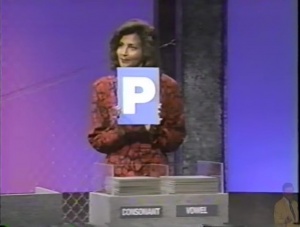 Laurie auditions as the letter-puller for Blockbusters.
Laurie auditions as the letter-puller for Blockbusters.
There are a few changes before the next round. Dividers appear between the contestants, because they're no longer allowed to confer with each other. The team trailing has the choice to pick letters, or let their opponents do the job. Whoever picks, there will only be eight selections – a "Wild" letter can be used for any letter of the alphabet.
Do they pay out for nine-letter words in this round? Because if they do, we're claiming the big bucks – DELATIONS is on offer, a traditional Countdown favourite. Our studio contestants get eight-letter words like SOLITUDE, which is almost spelled out on the board.
By asking the team who's behind to declare first, and with both players scoring, we're almost certain to see the lead change. And most likely change back – "Andrea, you need a two-letter word to tie, a three-letter word to win" is not the most climactic sentence in game show history.
The winners go on to the Countdown scramble, the main cash round. Our pair will see seven scrambled words, all on a theme. Only one of the words will be in play at any moment. Their objective is to unscramble all seven in 45 seconds to take the $10,000 jackpot; if they don't, there's $200 for each word correctly solved.
Viewers at home see the words a little bigger than they're shown to the contestants – back in 1990, they hadn't invented high-definition television, and some viewers will still have been watching in black-and-white. It's definitely a fast-moving round, with quite a bit of jeopardy.
The second half of the show is almost a direct copy of the first. Different selections, of course, and the lexicographers take the opportunity to entertain – add some colour, use words in context, and we'd probably have had etymologies if anything difficult had come up. Every word is spelled out on the computer board, and the longest word is shown to the audience. There's no maths round, unless you count "adding up the scores".
For much of the show, Michael Jackson rules with a calm demeanour, gently reminding players when they can confer, his clipped mid-Atlantic accent comes across as knowledgable in the same way Alex Trebek did. When the player gets all of the words in the final round, there is much screaming and bells ring and colours flash and it all goes entirely manic. This isn't the Countdown we know and love!
But it very nearly could be – this was a perfectly fine programme, no worse than many of the games around in 1990. Countdown was not better than many of the games around in 1990, and never got past this pilot episode Stateside.
Over here, Countdown continued to run, and run, and run, and marks its 41st birthday this Thursday.
In other news
The results are in, and the winner of the Eurovision Song Contest is... Liverpool! According to numbers released by the organisers, the net economic benefit to Merseyside was £54.8 million (€ 63 million). 162 million people saw some of the show on television, this column was amongst 779,000 to attend some sort of official or unofficial event, or just visit and sample the atmosphere. Just about everyone came away with positive feelings about Liverpool.
Well done to all concerned. Must do it again sometime soon.
Quizzy Mondays
Tom Moody won Mastermind, taking the recent Lord of the Rings movies, on which he was perfect. None of the contestants had a strong general knowledge round, so the second half of the show was more wrong than right, and that's most unfortunate.
Also Rans took their place in Only Connect quarter finals, beating the Isotopes by 21-15. A stunning performance on Missing Vowels clinched the victory. Isotopes had the spot of the night, things described as spaghetti; they also had a couple of very near misses.
Trinity Cambridge won the first University Challenge repêchage match, beating Southampton 245-120. "There's plenty of time" came out of the host's mouth before any Southampton player had pressed their buzzer. Interruption of the night came on a question about "generations" in Spanish art; UC burnished its feminist credentials with pictures of women scientists who did the work for which men colleagues won Nobel prizes.
Quiz Digest
- Members of McFly go and see Bruce Springsteen play in concert. It's not known if Springsteen has seen some actually decent musicians lately. (Only Connect)
- When Dublin was flooded by whiskey, 12 people died. Nobody was killed by the explosion at the spirits factory, all the deaths were caused by acute alcohol poisoning from people who drunk the stuff. Hic! (Only Connect)
Look what's back! Survivor (BBC1, Sat and Sun) casts eighteen people on a remote beach, and asks them to vote each other off. CBBC has some Junior Eurovision Song Contest publicity on Friday. A new series of The Voice of Holland of ITV next Saturday, bring your own spinning chairs.
Pictures: Thames, Two Shakes Entertainment and Sony Pictures Television, Guber-Peters Entertainment Company, EBU/BBC
To have Weaver's Week emailed to you on publication day, receive our exclusive TV roundup of the game shows in the week ahead, and chat to other ukgameshows.com readers, sign up to our Google Group.

